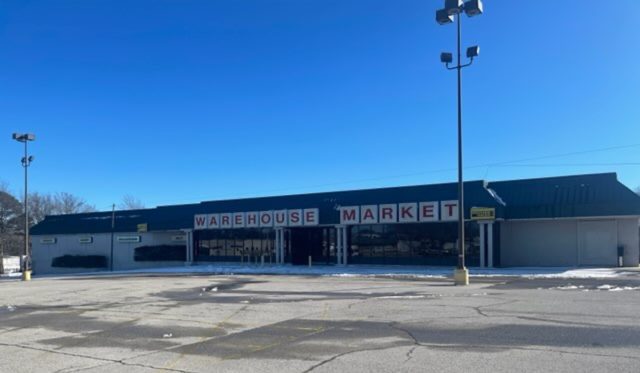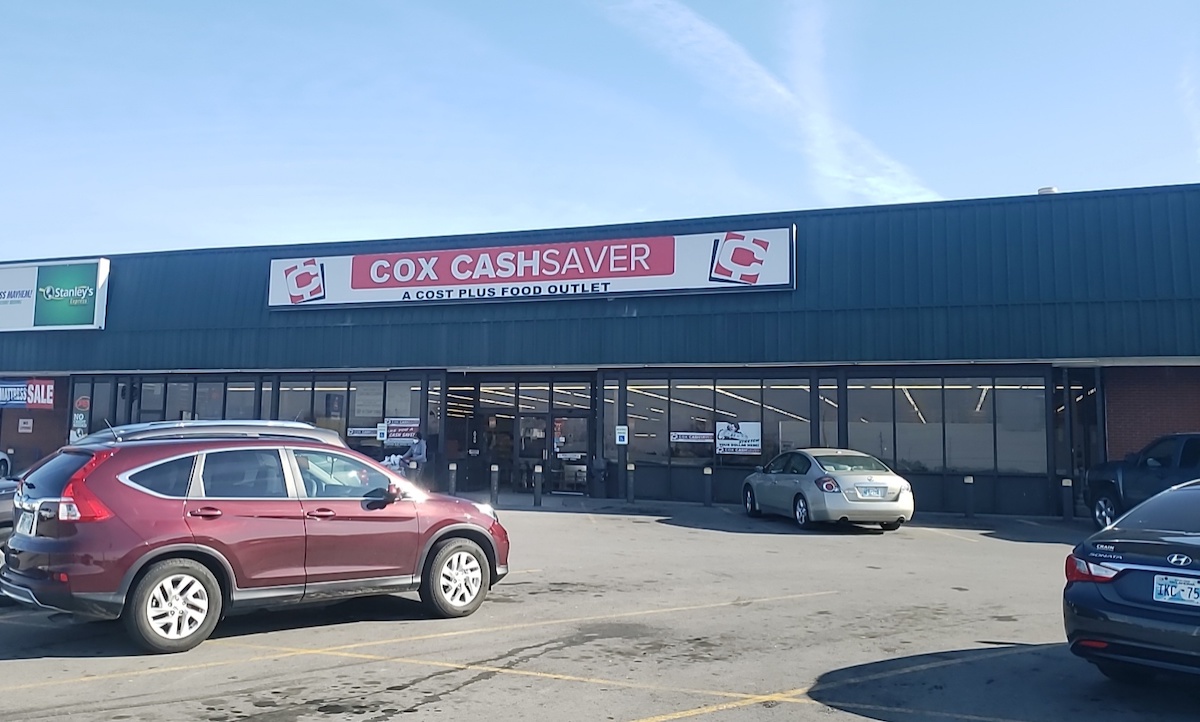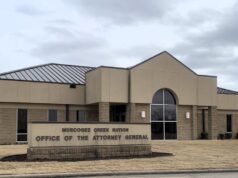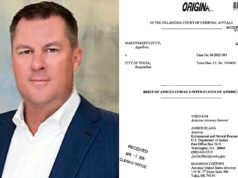

After the Okmulgee City Council unanimously passed a $250,000 incentive package Jan. 18 so Warehouse Market would re-establish a grocery store at its previous 420 E. 8th St. location, it remains unclear whether the company will continue to operate its current location, which has been embroiled in a state-tribe dispute over sales tax jurisdiction.
The incentive package is intended to renovate the 8th Street location, which originally closed in 2017. The grocery company opened its 1701 S. Wood Dr. location in late 2016 under a separate brand: Cox Cash Saver. Now, five years later, the company will reopen its previous location, which sits in a central part of town and is a five-minute drive north of the Wood Drive location.
Okmulgee leaders hope the development will provide more of the town’s residents with access to fresh groceries and will eliminate risk that the Cox Cash Saver store could close and leave the community with only a Walmart grocery location.
That uncertainty has stemmed from the Wood Drive store being located on land leased to a private company by the Bureau of Indian Affairs. As a result, the store has been the subject of a protracted legal battle over whether sales tax collected from that store should be sent to the state of Oklahoma — and the city and county — or to the Muscogee Nation.
The 8th Street property is owned directly by Warehouse Market, which purchased the site in November. If the company decides to close its Wood Drive location, the legal question of sales tax jurisdiction on such BIA-leased land would likely go unanswered, for now.
‘Give people some options’

In an email to NonDoc, Steve Davis — the owner, executive vice president and chief financial officer of Warehouse Market — stated that “Cox Cash Saver would like to open their 8th Street location this fall in time for the holidays,” though the opening may be delayed by supply issues.
According to Davis, the 8th Street location measures 40,000 square feet — 25 percent larger than the Wood Drive store.
The city’s $250,000 incentive package will be paid to the Cox Cash Saver on its first day of business at the 8th Street location, Okmulgee Mayor Richard Larabee said.
However, the deal is contingent on repairs and remodeling being completed, as well as a requirement that the store remain open and operating for 10 years. If the store closes before the 10-year mark, Cox Cash Saver will pay the city of Okmulgee $25,000 for each year remaining in the 10-year period.
Larabee, who won reelection Feb. 8 with 54.4 percent of 709 total votes, said he believes the move will help the community by bringing a grocery store to another area of town.
“Right now, the grocery store is directly across from Walmart, and that really doesn’t serve a lot of the citizens of Okmulgee by having them so close together, so it will be nice,” he said. “It will separate our two major grocery stores and give people some options that maybe if they’re relying on walking to the store or something like that, it ought to help them.”
Tax questions lead to uncertainty for new store
Davis declined to comment on whether Warehouse Market would continue operating its location at 1701 S. Wood Dr., citing nondisclosure agreements. But he said the store “is a very successful location for Cox Cash Saver.”
Asked about the prospect of moving off the property that pulled his company into four years of litigation, Davis said, “Cox Cash Saver has a great landlord/tenant relationship with the Muscogee (Creek) Nation and their representatives and with the city of Okmulgee.”
“All businesses learn to support their many relationships including their suppliers, vendors and landlords,” Davis said.
Larabee said he would be surprised if Warehouse Market continued to operate the 1701 S. Wood Dr. location, owing to the underlying tax question.
“The impression that Steve (Davis) gave us — the owner of Cox Cash Saver — is that he doesn’t want to deal with the tax questions anymore,” Larabee said. “So it would surprise me if he kept that other location.”
Muscogee Nation communications director Jason Salsman told NonDoc tribal leaders had no comment on the situation. It is unclear whether the nation is still seeking to collect sales taxes from the current store on Wood Drive.
Larabee noted another potential development that he said might affect the taxation question at the Wood Drive store.
“They’ve redone their LLC for that property as a Muscogee Nation LLC,” Larabee said. “So now there’s some question because they’re formed under the Muscogee Nation, whether there would be a tax challenge or not.”
Davis said the Wood Drive store is owned by Warehouse Market, Inc., an LLC registered with the state of Oklahoma.
Asked about the new LLC Larabee mentioned, Davis said, “There is a LLC registered with the Muscogee Nation, but it is not owned by Warehouse Market or its officer or owners.”
Follow @NonDocMedia on:
Background on litigation
The sales tax dispute between Warehouse Market, the Oklahoma Tax Commission and the Muscogee Nation dates back to 2018, about two years before the July 2020 U.S. Supreme Court ruling in McGirt v. Oklahoma that affirmed the Muscogee Nation’s Indian Country reservation and raised additional questions surrounding taxation jurisdiction in eastern Oklahoma.
In September 2018, Warehouse Market received a letter from the Muscogee Nation Tribal Council stating that, effective Oct. 1, 2018, sales at the store would be subject to a 6 percent sales tax from the Muscogee Nation. Additionally, the letter stated that Warehouse Market is only obligated to collect taxes for the Muscogee Nation Tax Commission and has no obligation to pay taxes to any city, county or state agencies.
The company subsequently notified the Oklahoma Tax Commission that, pursuant to the notice from the Muscogee Nation, the grocery store would stop remitting sales tax to the OTC after October 2018. The store had previously collected from customers and remitted to the OTC a combined 10.083 percent sales tax for state and local jurisdictions.
In November 2018, Warehouse Market received two letters within days of each other. The first, from the OTC, stated that the store was still required to submit local and state sales taxes and that failure to do so “would result in closure of the business and/or revocation of the business’s sales tax permit.”
The other letter, from the Muscogee Nation, stated that “Warehouse Market was in violation of tribal sales tax rules and would be subject to interest, fines, and/or revocation of license(s) if remedial action was not taken.”
Warehouse Market filed an interpleader lawsuit in Okmulgee County District Court in December 2018. In February 2021, the suit had moved to the Oklahoma Supreme Court, which ruled that the matter should be considered a tax protest and should be left to the three-member Oklahoma Tax Commission to decide.
The OTC ultimately ruled that the state, Okmulgee County and city of Okmulgee are entitled to the grocery store’s sales tax collections, Larabee said.
But OTC’s decision on the matter is protected as “confidential taxpayer information,” said Cassandra Sweetman, public information and press liaison for the state agency.
Throughout the litigation, Cox Cash Saver continued to collect 10.083 percent sales tax from customers and placed it in escrow.
After the OTC ruling, the city of Okmulgee received its portion of those collected sales taxes. Soon after, Warehouse Market approached the city to ask for $250,000 to help reopen its store on the 8th Street property.
Now, Warehouse Market has Okmulgee City Council’s approval to move back into its 8th Street location. The company will eventually decide whether to continue operating at its current location in the face of ongoing jurisdictional taxation questions.




















